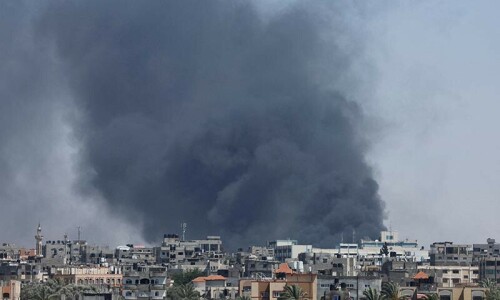THE Mardan suicide bombing was a grim reminder of the existing terror threat in the country, but the news from elsewhere is equally worrying. The Punjab Counter-Terrorism Department this week revealed that it had broken up an alleged cell of the militant Islamic State group in Sialkot — the cell apparently consisted of eight individuals who had in their possession propaganda material and were allegedly planning to launch a series of attacks across the country. It is too early to know if a pattern is emerging, but certainly there is no room for complacency. IS is the militant group du jour and would-be extremists are likely to be attracted to the latest that the world of ‘jihad’ has to offer. But examples from Karachi — where the Safoora Goth gang, with university-educated members, has been busted — and from Lahore — where recent allegations that a professor of a well-known private university was consorting with Hizbut Tahrir — suggest that extreme vigilance is needed.
The temptation is to believe that this is a new phenomenon. It is not. The murder of Daniel Pearl in 2002 was linked to Omar Sheikh, educated in prominent institutions in Pakistan and in the UK, and suggested an early link between centres of higher education and militant recruitment. Al Qaeda too has over the years tried to appeal to an urban, educated, middle and upper-middle class. The fear, though, is that IS’s appeal is building on the earlier iterations of militancy and that the militant group is significantly more sophisticated in its propaganda machine. When Iranian President Hassan Rouhani referred to the need to counter the negative image of Islam online, he surely was referring to the new and sophisticated tactics of militant Islam. Worryingly, states themselves appear least equipped to handle the emerging threat. Pakistan, for example, has banned YouTube for more than three years now, but still has no strategy for dealing with online hate material. The country’s regulators appear more determined to squash legitimate dissent than eliminating hate speech that encourages violence.
Whatever the attempts of the state, however, they must be aided by society and private-sector organisations. While the boundaries between privacy and security must be respected, it is surely the case that far too many institutions of higher education in the country remain lax when it comes to identifying dangerous elements in their midst. Higher education in the country remains mired in the battles of a generation ago. Today, the challenge is to produce college and university graduates who not only have a set of skills that makes them economically and socially relevant, but who can help put Pakistan on a path to stability and peace. It is not just Fata or other militancy-hit areas that have a terrorism problem. All of Pakistan does. Surely the fight to reclaim Pakistan and re-anchor it in its founding principles must be led by the centres of higher education.
Published in Dawn, December 31st, 2015








































